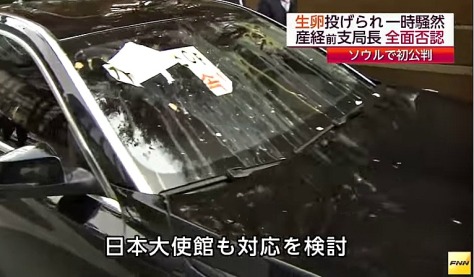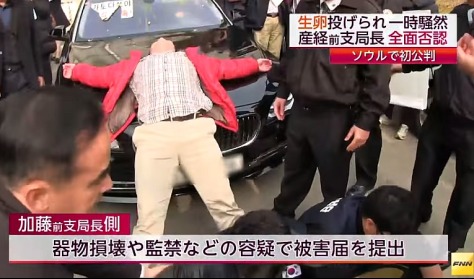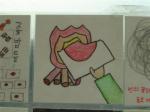Asahi Geinou, a Japanese weekly magazine, got an exclusive interview with Mr. Kato who was the former bureau chief of the Japanese Sankei Shinbun for Seoul. He was unlawfully arrested by the South Korean government only for a reason of reporting on S.Korean president’s scandal. The case is now becoming an international issue because the government obviously violates freedom of the press and human rights in this case. “Reporters Without Borders” also blamed S.Korea and call for the release of Mr. Kato quickly. At present、everybody knows that S.Korea is a repeated offender of the international law. Also at the Inchon Asian Games held in S.K recently, various unfair determinations or injustice by S.Korean staff in the games were revealed and they became major controversies. I wonder why the international bodies admits such country as S.K to hold so many international events?
The following is an excerpt from the article of Asahi Geinou. I think I translated this into English as accurately as possible, but I am still an English lerner, sorry if there’s mistranslation.
Korean protesters threw eggs at Mr. Kato’ car. 
Kato decide to file a damage report 
The protesters kicked two people with Abe and Kato’s masks
The former bureau chief of Sankei Shinbun for Seoul discloses information about the “S.Korea’s irrational suppression”
posted on Posted on October 28, 9:56 AM
Tatsuya Kato, the former Seoul bureau chief of Sankei Shinbun, was indicted by the prosecutor’s office of South Korea on a charge of defamation against S.Korean president. Amid concerns about his safety, we got an exclusive interview with him. The interview has pointed out the reality of the odious suppression from both the government and people of S.Korea. We accuse strictly the behavior of the outrageous “autocratic government” that treads on free-speech laws and trample on human rights.
“The court renewed the period of the ban on Mr.Kato’s leaving S.K for 3 further months”——–On 14th October, the prosecutor of S.Korea made the determination for Tatsuya Kato who was the former Seoul bureau chief of Sankei Shinbun. The prosecutor first made the decision to ban Kato from leaving S.K on 7th August. This was as “punishment” for his signed article about the president Park Geun-hye published in Sankei Web on 3 of the same month.
The president Park went missing on the day of accident of the ferry in April. On 3rd July, S.Korea’s newspaper Chosun Ilbo reported in its column, that the reason for her disappearance from public was “meeting a married man secretly” The man was Chong Yunfei, 57 years old, who was the president Park’s former secretary. After that he divorced with his wife, and allegedly he gave all his property to his wife in return to keep her mouth shut about any matters that she knew during their marriage.
Quoting these reports from the Chosun Ilbo newspaper, Mr. Kato wrote an article as the following
“President Park Geun-hye went missing on the day the ferry sank..Who was she with?”
The report was not written in Korean, but Japanese, and only published in Japan.
A S.Korean conservative group, however, sued him for libel against the President. On receiving the lawsuit, the South Korean prosecution concluded on 8, that Kato had written a false report. then decided to put the accused on a house arrest and to extend the period during which he was to be prohibited from leaving the country, on account of defamation under laws regarding the promotion of the use of telecommunication networks, the protection of information, and other issues.
“Everyone who goes against the president Park will face a criminal charge ”
About this kind of behavior of S.Korea govt, Genki Fujii, a Japanese scholar of international politics, said, seemingly shocked, ” S.Korea has proved by itself that it was not a democratic nation. It’s not always true that a country with the electoral system is a democracy because North Korea or former Soviet Union held formal elections. The most important factors of democratic nation is that the law, but a dictator, rules over the county. Also true democracy can never exist unless it has a free press. This case has probably exposed the fact that S.Korea is not an advanced country, and the country ended up lowering itself ”
In Seoul, there have been frequent demonstrations where protesters dragged around those who put on the face masks as Kato or Japanese prime minister, Abe. Some of them even forced these masked men to bow themselves to the ground or kicked them as a performance. Under the cruel crackdown against Kato from both the government and people, could his own safety be assured?
—– Kato replied to this question by himself through the press bureau of Sankei Shimbun.
He said, “Everyday, several protest groups hold the demonstrations for a short time (normally one or two hours, but three hours at longest) in front of the ground-floor entrance of the Kyung hyang Worldnet’s building in Seoul, in which the branch office of Sankei is located. They once tried to set fire to a life-sized straw figure with my picture, and fought with the restraining police.
It surely represent the situation Kato is in that we have to interview him in writing due to concerns about wiretapping.(…)
When Park Chung-hee, Park Geun-hye ‘s father, was the president of S.Korea, the Sankei Shimbun and South Korean government were tightly bonded with the common goal of anticommunism. However, after the Cold War ended, S. Korea started to take Sankei as its enemy. There was even an action to dismantle Sankei’s office in Seoul when one of Sankei’s group businesses published the controversial “New Textbook on History” in 2001. The action against Kato this time exceeds the case in 2001. Kato’s first trial is scheduled on Nov. 15. The authorities has extend the period of Kato’s interdiction to leave the country two times. Now there is the possibility that the restriction would continue “indefinitely” as the trial lasts long.
“Barring me from leaving this country is an action to limit an individual’s free will and against human rights,” Kato said. “I have told the prosecutors many times to lift the order because I have no intension to flee or abandon evidences, have sincerely accepted voluntary interrogations, and evidences are already secured,” he continued. “Still, the order has not been removed.
It is said that S.Korean govt puts pressure even on unrelated members of the bureau of Sankei shinbun.
A Sankei reporter said,
“At first, the South Korean Government made a secret proposal, ” If you apologize to us here, we will settle out of court” or ” We want you to correct the article.” When the Japanese government released the Kono statement at S.K govt’s earnest request, they took advantage of it on the world stage. Once Sankei complies with their demands. it will be just a matter of time before S.Korean govt pushes propaganda as ‘The Sankei went down on its knees before S.Korea!’ So we absolutely can’t allow ourselves to approve their request. Now, I suspect that our office phones are picked up calls by the authorities of S.K because we heard a strange noise while on the phone. Besides, it seems that it has a tail on not only Kato himself but also another Sankei correspondent for Seoul who is not involved in the case.”
The Sankei shinbun and Mr. Kato face for a pride of the press against S.Korea. Genki Fujii says with anger “North Korea abducted many Japanese citizens, also this case is like an abduction by S.Korean govt”
However Mr. Kato says thoughtfully “I don’t think my situation right now is ‘strictly restraint,’ but I feel much pain about the current situation that I sometimes can’t get in and out of my office because of demonstrations by Koreans or can’t still assume my new duties as a member of editorial board of city news, in charge of Tokyo Metropolitan Police and the North Korean abduction issue.”
Originally, though the case is the matter of defamation, S.K govt targeted only at Mr. Kato who just quoted the articles which S.Korean media wrote earlier, while the media was not accused of any crime. We hear that a lot of S.Korean reporters are frightened by the matter now.
A reporter of a major S.Korean media testifies as follow..
“It’s true that the president Park has someone special and who is Mr. Chung. Also her secret mmeeting with him is true. Personally speaking, I object to charge against Mr. Kato. If we tolerated such an unjust govt’s act like this, sooner or later my turn would come. S.K will be right back on the military regime track “(…)
http://www.asagei.com/27599
http://www.asagei.com/27601
http://www.asagei.com/27603
Korean people who are hitting two persons wearing masks of Mr. Kato of the Sankei newspaper, and Japanese Prime Minister Abe in a demonstration.
https://www.youtube.com/watch?v=D0hglKd5FDY





